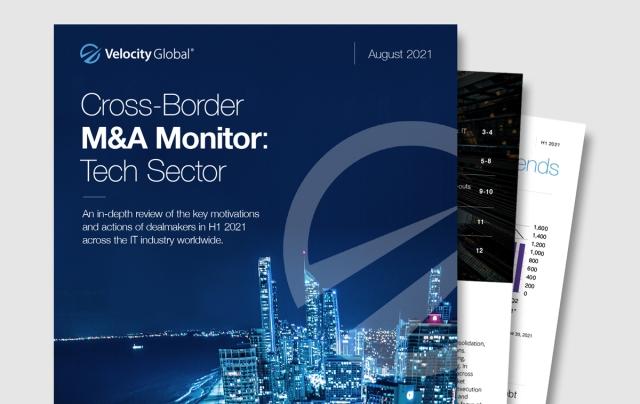DENVER, August 24, 2021 –
- Deal multiples return to 2019 levels
- Cross-border software deals skyrocket
- Cross-Border M&A Monitor: Tech Sector released today
Cross-border tech merger and acquisition deals accelerated in the first half of 2021, on a record pace in transactional volume. That data from PitchBook was released today in the Cross-Border M&A Monitor: Tech Sector published by Velocity Global, the leading provider of global employment solutions.
The late surge of activity in 2020 continued through the first half of this year with approximately 1,000 cross-border tech deals closed, for an aggregate of $139.9 billion.

“The deal multiple increased in the first half of this year and returned to 2019 levels, which indicates investor confidence in global economic recovery,” said Rob Wellner, Velocity Global chief revenue officer. “Increased multiples drive an even greater need for pre-deal preparation and successful integration after close.”

Data shows greater debt usage fueled a rise in the median transaction multiple. Private Equity firms were even more active in cross-border tech acquisitions in the first six months of 2021 over last year, which likely contributed to the debt usage surge.
Software value already tops 2020
The value of cross-border M&A deals for Software companies in the first six months of 2021 already topped full-year values for 2020 at over $100 billion.
“The pandemic accelerated digital transformations, funneling budgets to build or buy the necessary tools,” added Wellner. “The acquirers are tech and non-tech alike, with tech adding to their stack, and non-tech adding to their in-house capabilities.”

Pandemic Operations Drive Cross-Border M&A Interest
As evidenced by the increase in median deal size in cross-border tech M&A, dealmakers paid up with confidence. Cross-border acquisitions require businesses to navigate a distributed workforce, and the global pandemic prompted companies of all sizes to invest in the proper resources.
“Integration will always have complexities like country-specific labor laws and regulations, but companies are more willing than ever to invest in cross-border diversification and leverage tools to manage a distributed workforce,” said Wellner. “Work from home is really no different than work from another country as it relates to workflow and employee engagement.”
